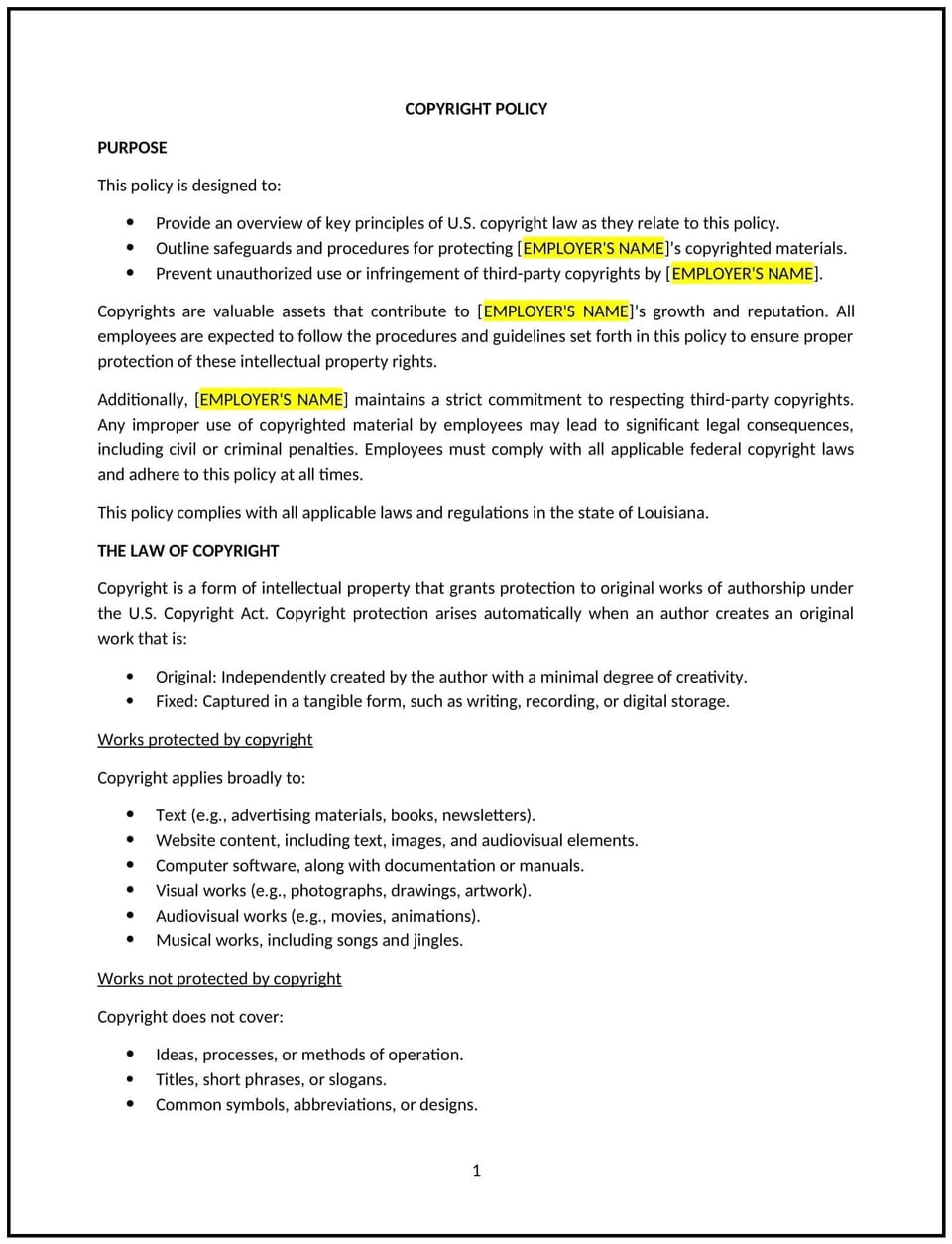Copyright policy (Louisiana): Free template

Copyright policy (Louisiana)
This copyright policy is designed to help Louisiana businesses establish clear guidelines for the use, creation, and protection of copyrighted materials. It outlines responsibilities, permissible uses, and procedures to address potential copyright issues, ensuring that intellectual property is respected and managed effectively.
By implementing this policy, businesses can mitigate risks, protect their assets, and foster a culture of creativity and responsibility.
How to use this copyright policy (Louisiana)
- Define copyright scope: Clearly specify what constitutes copyrighted material, such as written content, images, software, and other creative works.
- Outline acceptable use: Provide guidelines for the proper use of copyrighted materials, including permissions, licenses, and fair use considerations.
- Address employee responsibilities: Clarify employee obligations to avoid copyright infringement and protect the company’s intellectual property.
- Establish reporting procedures: Specify how employees should report potential copyright infringements or misuse of copyrighted materials.
- Detail consequences for violations: Include disciplinary actions or remedies for copyright violations by employees or third parties.
- Include intellectual property protection: Outline steps for protecting the company’s copyrighted materials from unauthorized use.
Benefits of using a copyright policy (Louisiana)
Implementing this policy provides several advantages for Louisiana businesses:
- Protects intellectual property: Safeguards the company’s creative assets from unauthorized use or infringement.
- Reduces legal risks: Helps prevent potential disputes or liabilities related to copyright violations.
- Promotes ethical practices: Encourages employees to respect copyright laws and uphold professional standards.
- Enhances brand integrity: Protects the originality and credibility of the company’s work.
- Reflects Louisiana-specific considerations: Aligns with local practices and cultural norms for intellectual property management.
Tips for using this copyright policy (Louisiana)
- Educate employees: Provide training on copyright basics, including fair use and licensing requirements.
- Use appropriate licensing: Ensure all third-party content used by the business is properly licensed or approved for use.
- Monitor usage: Regularly audit materials to identify potential copyright issues or unauthorized use.
- Protect company assets: Implement watermarking, digital rights management, or other protective measures for copyrighted works.
- Update regularly: Revise the policy to reflect changes in copyright laws, technology, or business needs.
Q: What materials are covered under this copyright policy?
A: Materials such as written content, images, videos, music, software, and other creative works produced or used by the business are covered.
Q: How should businesses handle the use of third-party copyrighted materials?
A: Businesses should obtain proper licenses or permissions before using third-party materials and ensure compliance with fair use guidelines where applicable.
Q: What steps can businesses take to protect their copyrighted materials?
A: Businesses can use watermarks, copyright notices, or digital rights management tools to protect their intellectual property from unauthorized use.
Q: How can employees report potential copyright violations?
A: Employees should report suspected violations to their manager or a designated compliance officer, providing details about the incident.
Q: What are the consequences of copyright violations by employees?
A: Consequences may include disciplinary action, up to and including termination, depending on the severity of the violation.
Q: How often should this policy be reviewed?
A: The policy should be reviewed annually or whenever there are significant changes in Louisiana or federal copyright laws.
Q: Can businesses use copyrighted materials found online?
A: No, materials found online are generally protected by copyright, and businesses must obtain permission or licenses before using them.
This article contains general legal information and does not contain legal advice. Cobrief is not a law firm or a substitute for an attorney or law firm. The law is complex and changes often. For legal advice, please ask a lawyer.


